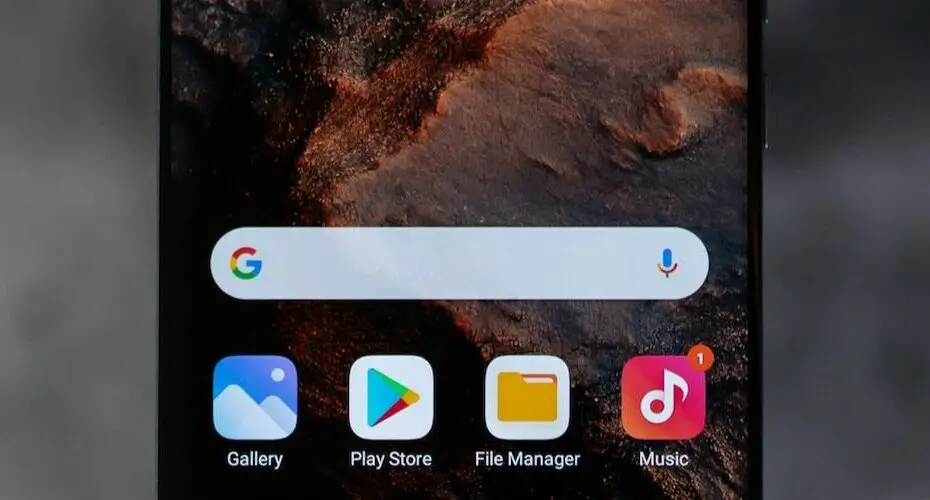Headphones are better for ears because they block out external noise while you are listening to music or watching a movie. Earphones, on the other hand, allow you to still hear outside noise. It is up to you which type of headphones you prefer.
The gist of it
Most people prefer headphones because they allow you to listen to music or a podcast without having to worry about others hearing it. This is especially useful if you are trying to listen to something privately. Headphones also offer a better sound quality than earphones. Some people, however, prefer earphones because they are more discreet. They are also less likely to get dirty or damaged.
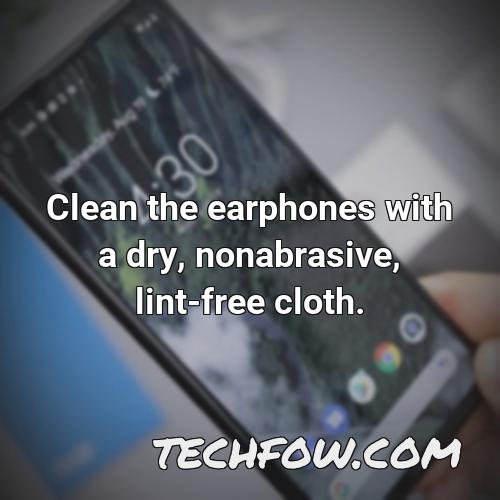
Is Earphones or Headphones Better
Headphones offer a better noise cancellation feature as compared to earphones. It is because the components and mic are placed in the headphone which helps to filter out unwanted sounds. Some headphones also use noise cancellation filters which help to remove unwanted sounds. This makes the audio clearer and easier to hear.
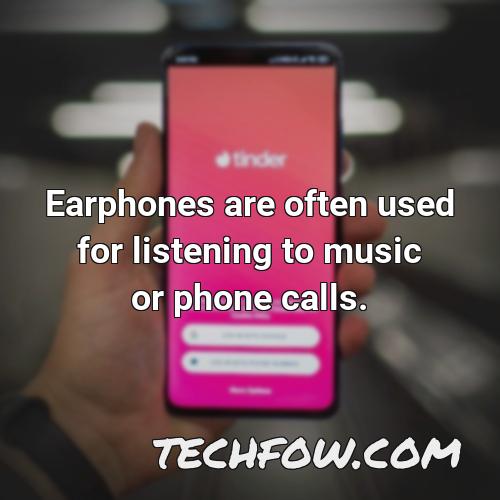
Which Headphone Is Best for Ear Health
The best headphone for ear health is the Bose 700. They have a great sound and are very comfortable to wear. The Sony WH-1000XM4 are also excellent headphones for ear health, but they are a bit more expensive. The Sennheiser Momentum 2 are a sleek design and have great sound, but they have a low leakage rate, so they might not be the best for someone who is worried about hearing damage. The Audio-Technica ATHM50XBT are also a good choice for ear health, as they have a smooth mids and great sound. The Sony MDR7506 have a low leakage rate and are a good choice for people who are worried about hearing damage, but they are a bit more expensive than the other headphones mentioned. The Sennheiser HD 800 S are a good choice for people who want a comfortable headphone that has great sound. The Sennheiser RS 175 RF are a good option for people who want a rock-solid connection and good sound.
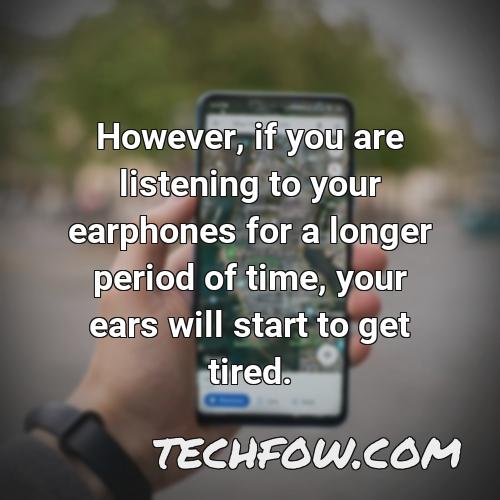
Are Earphones More Damaging Than Headphones
The idea that earbuds are more damaging to hearing than other headphone types is just false. Earbuds do not put pressure on the ear like headphones do and they do not create an intense sound. Earbuds do not cause as much damage to the ear canal as headphones do. In fact, earbuds are not even considered a true form of headphones because they do not put pressure on the ear. Earbuds are just small earphones that are inserted into the ear.
Cory Portnuff, an audiologist at the University of Colorado Hospital, says that earbuds are not more damaging to hearing than other types of headphones. Earbuds do not put pressure on the ear like headphones do and they do not create an intense sound. Earbuds do not cause as much damage to the ear canal as headphones do. In fact, earbuds are not even considered a true form of headphones because they do not put pressure on the ear. Earbuds are just small earphones that are inserted into the ear.
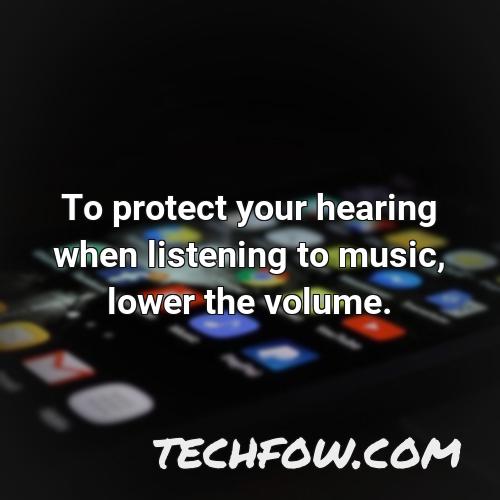
Is It Okay to Wear Earphones Everyday
Earphones are often used for listening to music or phone calls. They are usually inserted into the ear canal, where they rest against the ear drum. Earphone use can often be normal, but if it is prolonged, it can cause problems. Prolonged earphone use can cause the earwax to become compressed, which can make it less fluid and harder for the body to naturally expel. This can also lead to the earwax becoming compacted to the extent that the body induces inflammation. If you are using earphones all the time, it is important to be careful not to cause any of these problems.

Are Earphones Safe for Ears
The maximum sound level your earphones can expose you to is 100dB. This level is equivalent to the sound of a jet engine at 100 feet away. For someone who is exposed to this level of sound for a maximum of 15 minutes a day, their ears will not be damaged. However, if you are listening to your earphones for a longer period of time, your ears will start to get tired. If you are listening to your earphones at a level above 85dB, you are putting your ears at risk for damage.

How Do I Protect My Ears With Headphones
When you listen to music, you should try to lower the volume so that it is not too loud. This will help to protect your hearing. Some people choose to wear noise-cancelling headphones, which will help to even further protect your hearing. If you are listening to music on your phone, you should always choose headphones over earbuds. This way, the sound is being transmitted through an amplifier and not directly into your ear. The 60/60 rule is also very important when it comes to protecting your hearing. You should listen to music for no more than an hour at a time, and you should never listen to music at a high volume. Lastly, you should set a volume limit for yourself so that you do not over-hear the music.
What Is the Side Effects of Earphones
When you listen to music or audio with headphones, you are funneling all of the sound into your ears. This can cause a lot of noise and pressure inside your ears, which can lead to problems like tinnitus (ringing in your ears), hyperacusis (overwhelming sensitivity to sound), hearing loss, and more. It’s important to be aware of the side effects of earphones, and to use them responsibly so that you don’t experience any problems.
How Much Headphone Use Is Too Much
Headphones are a common accessory for people who listen to music or watch videos. Some people use headphones all the time, while others only use them occasionally. Some people think that headphone use is okay if the sound level is below 85 dB, but others think that headphone use is too loud and can cause ear damage.
There is no definite answer to this question. Some people think that headphone use is okay if the sound level is below 85 dB, while others think that headphone use is too loud and can cause ear damage.
There are a few factors that can affect how loud a sound is. One factor is the volume, or how loud the sound is. Another factor is the intensity, or how strong the sound is. The louder the sound, the more intense the sound.
The International Agency for Research on Cancer (IARC) as classified sound levels above 85 dB as possibly carcinogenic to humans. This means that there is some evidence that exposure to sound levels above 85 dB can cause possible ear damage with exposure of more than two hours, while exposure to sound of 105 to 110 dB can cause damage in five minutes.
There is no definite answer to this question. Some people think that headphone use is okay if the sound level is below 85 dB, while others think that headphone use is too loud and can cause ear damage.
Some people think that headphone use is okay if the sound level is below 85 dB, but others think that headphone use is too loud and can cause ear damage.
There are a few factors that can affect how loud a sound is. One factor is the volume, or how loud the sound is. Another factor is the intensity, or how strong the sound is. The louder the sound, the more intense the sound.
The International Agency for Research on Cancer (IARC) as classified sound levels above 85 dB as possibly carcinogenic to humans. This means that there is some evidence that exposure to sound levels above 85 dB can cause possible ear damage with exposure of more than two hours, while exposure to sound of 105 to 110 dB can cause damage in five minutes.
Some people think that headphone use is okay if the sound level is below 85 dB, but others think that headphone use is too loud and can cause ear damage.
There is no definite answer to this question. Some people think that headphone use is okay if the sound level is below 85 dB, while others think that headphone use is too loud and can cause ear damage.
Some
How Do You Stop Ear Pain From Headphones
-
Clean the earphones with a dry, nonabrasive, lint-free cloth.
-
Make sure earphones fit snugly without excessive pressure around your ears.
-
Keep the volume at 60% or less of the maximum level.
-
If you experience ear pain from headphones, clean the devices with a dry, nonabrasive, lint-free cloth and make sure earphones fit snugly without excessive pressure around your ears.
How Can I Protect My Ears While Wearing Headphones
To protect your hearing when listening to music, lower the volume.
Wear noise-cancelling headphones to help reduce the noise level.
Choose headphones over earbuds to reduce the amount of contact your ears have with the audio source.
Adopt the 60/60 rule – spend 60 percent of your time listening to music and 60 percent of your time doing other activities that don’t involve hearing damage.
Set a volume limit – don’t listen to music at a level that is too loud.
Closing words
To answer the question, “which is better for ears headphones or earphone?”, it depends on the person. Headphones are better for blocking out external noise while listening to music or watching a movie, while earphones allow you to still hear outside noise.

